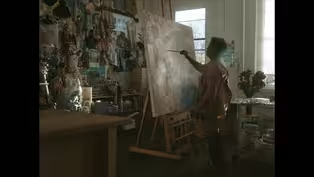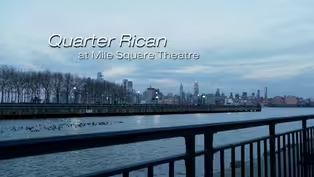State of the Arts
Seven Decisions of Gandhi
Clip: Season 41 Episode 6 | 8m 21sVideo has Closed Captions
Princeton Symphony premieres William Harvey's violin concerto, Seven Decisions of Gandhi.
The Princeton Symphony Orchestra performs the world premiere of William Harvey's violin concerto, Seven Decisions of Gandhi. Each movement musically tells the story of a decision that helped make Mohandas Gandhi the iconic leader he would become. The work is dedicated to the composer's friend, Gandhi's granddaughter, Elsa.
Problems playing video? | Closed Captioning Feedback
Problems playing video? | Closed Captioning Feedback
State of the Arts is a local public television program presented by NJ PBS
State of the Arts
Seven Decisions of Gandhi
Clip: Season 41 Episode 6 | 8m 21sVideo has Closed Captions
The Princeton Symphony Orchestra performs the world premiere of William Harvey's violin concerto, Seven Decisions of Gandhi. Each movement musically tells the story of a decision that helped make Mohandas Gandhi the iconic leader he would become. The work is dedicated to the composer's friend, Gandhi's granddaughter, Elsa.
Problems playing video? | Closed Captioning Feedback
How to Watch State of the Arts
State of the Arts is available to stream on pbs.org and the free PBS App, available on iPhone, Apple TV, Android TV, Android smartphones, Amazon Fire TV, Amazon Fire Tablet, Roku, Samsung Smart TV, and Vizio.
Providing Support for PBS.org
Learn Moreabout PBS online sponsorship[bright orchestral music] - I have always found Gandhi incredibly inspiring.
I was reading Gandhi's autobiography and he goes into the fact that he bought a violin and tried to study violin for six months while he was living in London.
And that blew my mind.
And it got me thinking about how the decisions that we make define who we are.
Because what if Gandhi had decided, "I really like this violin stuff, I'm gonna really go for it".
Who knows when India would've become independent or how it would've become independent?
- [Narrator] In March 2023, composer and violinist, William Harvey, premiered his new concerto, "The Seven Decisions of Gandhi" with the Princeton Symphony Orchestra.
- By September 2017, I had been invited to be guest concert master of the best orchestra in Africa, in Durban, South Africa.
And during that time, I got to meet Ela Gandhi.
- [Narrator] Ela Gandhi is a prominent South African peace activist, politician, and the granddaughter of Mahatma Gandhi.
- [William] I asked her, "Can you tell me more about how your grandfather thought he wanted to be a violinist?"
And so she talked about that.
- For me, it was a lovely experience to meet him and to listen to his ideas and about music itself.
I think musicians are generally very sensitive.
- And I asked her, "Would it be okay if someone writes a violin concerto inspired by your grandfather's life?"
[soothing violin ballad] She gave permission provided that I included in the piece two of his favorite hymns.
- These two bhajans, my grandfather loved them.
So one is "Raghupati" and the other is "Vaishnava Janato".
And the one is a chant, but it has good meaning because it also refers to all religions the unity of all religions.
But "Vaishnava Janato" talks about what is the quality of a good person?
- Sure, there's two very famous bhajans that I think all Indians know.
They were immortalized by Gandhi Ji's affection for them.
[both singing in foreign language] [moving violin concerto music] [moving violin concerto music continues] - [Narrator] William has worked in Argentina, Mexico, and Afghanistan.
There, he taught music for four years at the National Institute of Music in Kabul and immersed himself in the country's music.
Afghan music is based on Indian ragas and rhythms.
[performer chanting] It was a transformative experience that has deeply affected his work.
[instructor speaking in foreign language] - He is someone who has studied Indian classical music, understands how the systems work.
And for a piece that's designed as a beautiful collaboration between Indian classical and the Western classical music.
[dramatic uptempo orchestral music] - I became aware of these wonderful biographies by Ramachandra Guha.
And so I thought, "Well seven is kind of a magical number, and I'll read through both books and pick exactly seven decisions that made Gandhi the global nonviolence icon beloved today."
- [Narrator] The first movement deals with Gandhi's decision at 18 to sail to England in defiance of his community elders.
Another, was when he sold his violin.
- Gandhi, when he was in London to study, thought he would be an English gentleman and studied violin and then decided, "You know what, this isn't for me."
So, he did sell the violin.
[spirited violin music] The third movement Phoenix is about his decision in South Africa to build an ashram.
- He decided immediately, "I'm giving up my beautiful house in Durban, in the city, and I'm going to go and live on a farm."
And he approached his friends and asked them if they would like to join him in this experiment of communal living, of simple living, and of self-sufficiency.
[moving violin music] - [William] So in that movement, you hear a Christian hymn, you hear a Hindu hymn, you hear an imitation of the Muslim call to prayer, an imitation of the Jewish sofar.
And all blended together.
- [Narrator] Other movements depict his first call for civil disobedience in 1906 and later his decision to wear homespun cloth, leading to a boycott of English textiles.
- [Narrator] Thus began the Khadi or Homespun movement.
- The seventh movement is the "Salt March".
- The "Salt March" is the most significant event in the life of Gandhi Ji.
And the reason is because there was a tax on salt.
And so he chose this particular issue to mobilize the people that, "Let's protest against this and we will march and go to the seashore and make our own salt."
- And we do hear at the very end of the movement what appears to be a triumphant climax, marred with a dissonant chord.
And then, this sort of ethereal, quiet ending that quotes from one of the hymns, "raghupati raghav raja ram", and then the violin ascends very slowly and quietly upward to represent his soul after being assassinated.
[intense orchestral music] [intense orchestral music continues] I constantly struggle to find my own sense of purpose and motivation in life, particularly in light of the Taliban takeover of Afghanistan on August 15th, 2021, because for 10 years before that, my proudest achievement and the highlight of my life was the four years that I spent teaching violin in Afghanistan, a life commitment and achievement that are very much in line with Gandhi's ideas about how nonviolence and truth and love always win out in the end.
I would like to ask Gandhi his advice about Afghanistan.
[moving violin music] I'm not sure I have an answer.
I just know that music is the language with which I search for that answer.
[audience applauds]
Video has Closed Captions
Clip: S41 Ep6 | 7m 46s | In her paintings, Philemona Williamson is finally opening up about her unusual upbringing. (7m 46s)
Quarter Rican at Mile Square Theatre
Video has Closed Captions
Clip: S41 Ep6 | 7m 32s | Quarter Rican, a hip hop musical about gentrification, identity, and parenthood. (7m 32s)
Providing Support for PBS.org
Learn Moreabout PBS online sponsorship
- Arts and Music
The Best of the Joy of Painting with Bob Ross
A pop icon, Bob Ross offers soothing words of wisdom as he paints captivating landscapes.













Support for PBS provided by:
State of the Arts is a local public television program presented by NJ PBS


